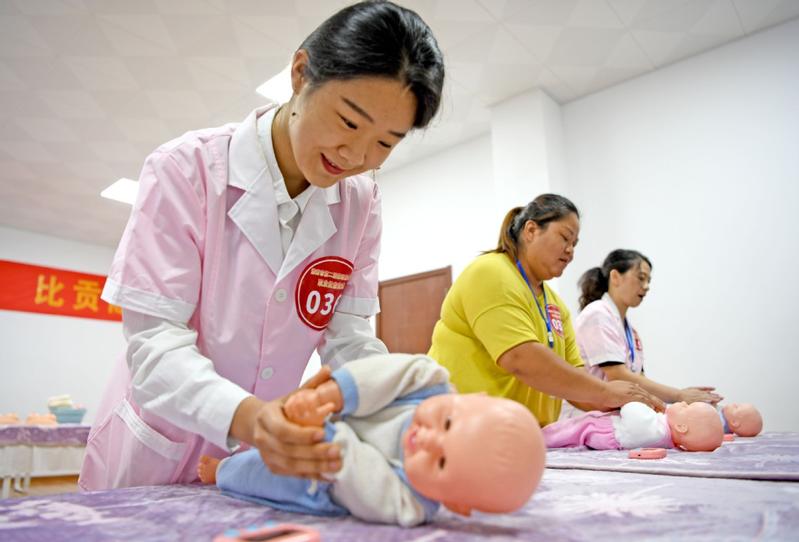 In this Sept 16, 2020 file photo, babysitters take part in a skills contest in Huainan, Anhui province. (CHEN BIN / CHINA DAILY)
In this Sept 16, 2020 file photo, babysitters take part in a skills contest in Huainan, Anhui province. (CHEN BIN / CHINA DAILY)
Despite the outbreak of COVID-19 early this year, most families have been exhibiting sustained demand for babysitters and domestic helpers while demand for cleaning services and other regular housekeeping work dropped during the period, industry players observed.
Demand for some emerging new professional services has increased, such as high-temperature fumigation and restroom disinfection. Chinese consumers have also shown higher and more specific need for cleaning home appliances such as air conditioners and kitchen ranges. We need to become more professional in those areas.
Mu Lijie, chairman of the Beijing Homemaking Service Association
Such a trend has reminded housekeeping service providers that when the external environment changes, consumers still exhibit a stable demand for hiring babysitters, postpartum nannies and eldercare helpers-positions that require certain professional skills-said Beijing Ainong Housekeeping Service Co.
"The housekeeping sector suffered a short-term impact due to COVID-19, but the contagion has further pushed digitalization of the sector, and some companies have been able to find some new business opportunities," said Mu Lijie, president of Beijing Ainong Housekeeping Service Co.
"For instance, demand for some emerging new professional services has increased, such as high-temperature fumigation and restroom disinfection. Chinese consumers have also shown higher and more specific need for cleaning home appliances such as air conditioners and kitchen ranges. We need to become more professional in those areas," said Mu, who is also chairman of the Beijing Homemaking Service Association.
ALSO READ: Boomtime for housekeeping service providers
In addition, everyday housekeeping services such as cleaning windows, floors and other areas of the home, as well as cooking and dish-washing, have rebounded as the contagion continues to be brought under control. But the rebound is not as significant as expected, said Ainong.
Housekeeping service providers have been strengthening their training of employees in certain areas of expertise to help them become more competitive. Ainong, Dutch dairy company Royal FrieslandCampina, Beijing Tongzhou Fuping vocational training school and the China Foundation for Poverty Alleviation have launched a rural revitalization fund to train poverty-stricken women to become postpartum nannies in cities.
After four years of operations, the program has trained more than 1,200 poverty-stricken women, and they have become better off with their average monthly salaries reaching between 4,500 yuan (US$673) and 8,000 yuan. This is three times higher than their previous incomes as farmers.
ALSO READ: New jobs emerge as service sector grows
They also help alleviate pressure among many urban families in densely populated first and second-tier cities. There is clearly a demand-supply gap, with market demand for quality nannies on the rise.
"With higher disposable incomes, more Chinese families are able to afford housekeeping services. Chinese women are showing an increasing sense of independence. This is encouraging more women to work, and hiring domestic helpers could simplify their lives and create more quality time and convenience," said Neil Wang, president of consultancy Frost & Sullivan in China.
ALSO READ: New rules bring order to housekeeping
Next year, the Fuping vocational school and Ainong will together train another 1,000 impoverished women to become nannies. In addition to teaching basic toddler-rearing skills, the program has now added psychological tests, communication training and professional courses about postpartum depression to its curricula. Thus, postpartum nannies can better help their employers to alleviate some psychological stress.
With more detailed and specialized training, such programs can help improve the comprehensive service quality and professional standards of nannies to meet diversified demand, Ainong said.
"Family members face changing roles and endure corresponding pressure with the arrival of newborns," said Zhao Fang, a professor of School of Social Development and Public Policy at Fudan University.
"With professional training, postpartum nannies can play a positive role in the special moment of family life cycle transformation. They can help families with childcare, and also help alleviate anxiety among new mothers," Zhao said.
ALSO READ: Housekeeping now a major at Shanghai university
Liu Wenkui, vice-president of the China Foundation for Poverty Alleviation, said the program effectively utilizes the advantages and skills of women from impoverished areas and targets demand among urban families.
"It has helped rural women learn systematic professional knowledge and provide them a clear career path to get out of poverty and become self-reliant and richer," Liu said.


